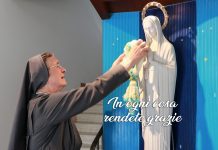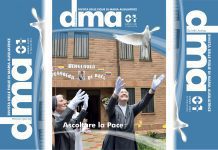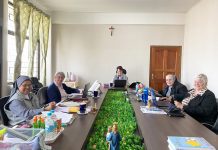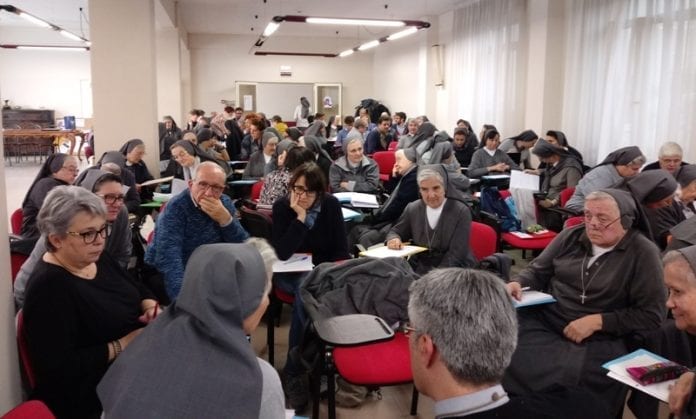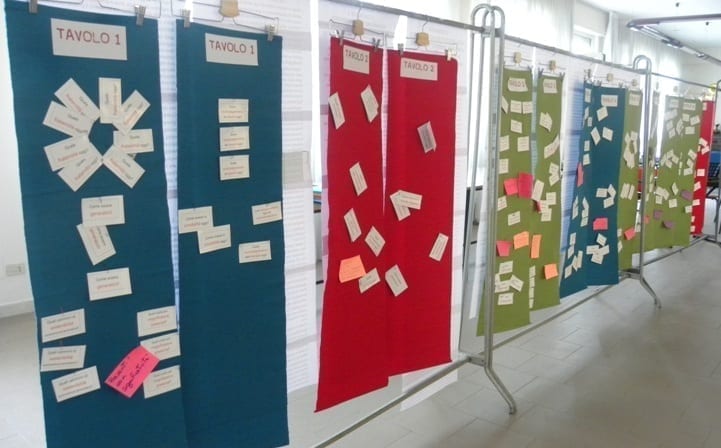Calambrone-Tirrenia (Italy). The Provincial Chapter of Our Lady of Good Counsel Province (ILS) took place from 31 October to 3 November 2019.
“The Provincial Chapter is a convocation that comes from the Father and we are the Province of Our Lady of the Cenacle. We are here convened in a new Cenacle where, with Mary, we wish to await the Holy Spirit who will reach each of us in different and new ways. I like to think of this room as the ‘upper room’ where the Holy Spirit will reach each one. Are we willing to leave the Holy Spirit free, to leave to Him the complete direction of this experience? I ask: are we really ready?”. With these words, the Provincial, Sr Carla Castellino, opened the ILS Provincial Chapter.
After the initial prayer, work began with the first phase of discernment used in the Youth Synod, that of recognizing. The report of the Provincial offered a rereading of the provincial journey of the last six years from which it is possible to draw the emerging challenges and the ways to continue the journey.
The solemn celebration of First Vespers of the Solemnity of All Saints introduced the Gospel that will guide the XXIV General Chapter with the signs of water and wine. Water represented our offering all the situations of personal and community suffering, and wine is the contemplation of the miracle of water that in the hands of Christ becomes good wine for everyone.
In the afternoon, the phase of interpreting was addressed. Professor Raffaele Mantegazza offered to the assembly, composed of 65 FMA, 2 novices, and 20 youth and laity, a report on the theme of GC XXIV: “Communities that generate life in the heart of contemporaneity.” We concluded the day by giving to the Lord all that we listened to and reflected on, during the Eucharistic Celebration celebrated by the ICC Provincial, Fr. Stefano Aspettati.
The second day with the laity opened with listening to some significant experiences that they offered for the reflection of the Chapter, the elements of generativity that are also possible for the communities.
SCN Worker Sisters, who wish to offer young people a place to know about religious life. Of themselves, they write: “The Nazareth community was born as a youth center of the Congregation of Worker Sisters and becomes, with the arrival of the first aspirants, a home of first formation for aspirants and postulants. In the community, young people can share life for a few hours or a few months. Whoever is in the community, alongside their work or study, collaborates with all pastoral activities and with the management of the home.” Among the elements of generativity that those present identified, we find: a less structured reality that allows greater openness and flexibility, sharing, simplicity, attention to the person, home and family experience, relationships, and informality.
CHARIS Consortium, which places itself at the service of Religious Orders and other Ecclesial Bodies, with the primary aim of enhancing and supporting their direct management of works in favor of more fragile people and thus contributing to strengthening the original Charisms. The elements of generativity identified by those present were: the strength that comes from the network formed between congregations and lay people, an open listening to reality, the valorization of competent lay people for the management of works, the possibility of meeting and working together in gratuitousness, the encounter between different charisms and the idea that the charism belongs to everyone, even though with diversified aspects.
Reflection on the model of community offered by the experience of the Elbe of the Neighbor, an experience born in the Province in a process of re-signification of a presence in the dynamics of pastoral conversion. The proposed community model, a broad community, made up of FMA and lay people almost never residing in Rio Marina, is characterized as an experience of a ‘bridge community’, in which the participation at different levels of different subjects and in the responsible and shared management of three different organizations (Province, CIOFS-FP Toscana, and Vedogiovane Cooperative) contribute to making this reality sustainable and meaningful from various points of view. The elements of generativity identified by those present are: the centrality of the mission, which leads the group to reflect, rework, and redefine the model of community, an experience of pedagogy of the environment recognizable by neighbors, and those ‘far’ (= by those who do not knows the Salesian charism), strong involvement of the institutions and educational agencies of the area, offering of proposals and specific suggestions to those who come even only for a limited period to Elba del Vicino.
Experience of collaboration of some realities with the local Church: Parish of Formigine (MO), Diocese of Reggio Emilia, and Pastoral Zone of Cento (Diocese of Bologna). In these three realities, collaboration with the local Church is strong. From the three testimonies, those present highlighted the following elements of generativity: the value of collaboration and mutual esteem, opening beyond the walls of our homes, the significant exchange of skills, a greater possibility for deep listening to the territory starting from its needs and its resources, greater freedom not to feel we are ‘masters’, a fruitful exchange between educators and between educators and young people, the possibility of formative paths with young people, the possibility of putting at the service of the local Church our charism, our time to be with the young and among the people, structures not owned that constitutively favor a strong network with the area.
After this work of input, listening, and synthesis around the elements of generativity, this wealth of sharing was given to the Lord in the Eucharistic Celebration celebrated by the ILE Provincial, Fr. Giuliano Giacomazzi.
This was followed by the conclusion of the work with the laity for a contribution towards the definition of the final document and a further time for reflection and work, only with the FMA, directly on the draft document.
The last day of the Chapter began with an intense moment of prayer and Eucharistic adoration to entrust the work done and the approval of the final document to be presented to General Chapter XXIV.
At the end of the introductory prayer, only the FMA delegates of the communities and of the Province, the members of the Provincial Council, and the Provincial remained in the assembly to discuss and approve the final document rearranged on the basis of the observations and reflections offered by the group work. At the end of the meeting and after voting on the document, the delegate was elected to the General Chapter. From the voting, Sister Monica Lamandini was elected.
The final Eucharistic Celebration, celebrated by Fr. Francesco Marcoccio, Provincial Vicar of ICC, present at all the days, allowed the rich work of these days to be returned to God. Precious, in this line, is the homily of Fr. Francesco who, reading the Word of God of the day indicated some traits of generativity: the compassion and indulgence emphasized by the first reading; the look of Jesus toward Zacchaeus; calling him by name, which restores dignity and creates a relationship.
In conclusion, there is the message of the Provincial, Sr. Carla, who recalled that as delegates, each was sent by her own community to the Chapter, and now it is the Chapter Assembly that sends them back to the communities to transmit the experience and enter deeply into the content lived together.



